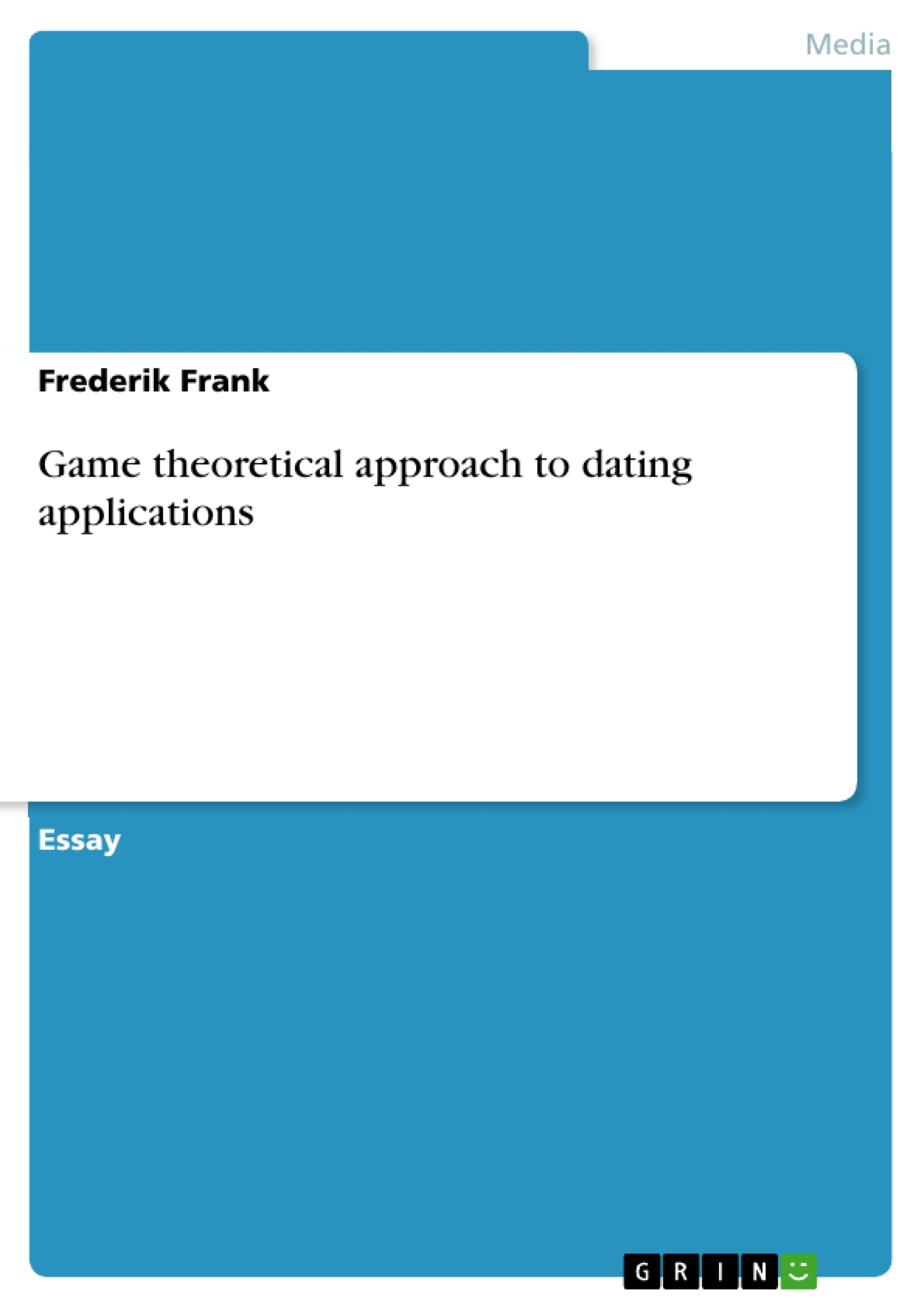The on-going process of technological innovation and expansion combined with a more and more fast-paced, dynamic and global world result in a slow take over of computers and artificial intelligence in fundamental human task areas. One example of how technological progress invades into our daily life is the invention of dating applications that enhance the search for a possible relationship partner by providing a distinct platform for people with similar purposes.
Since the interaction on these platforms are simultaneous actions of a group of human beings that yield a specific result – getting to know possible partners – the situation can be analysed from a game theoretic perspective. During this paper I will firstly elaborate on the underlying assumptions of my model. Afterwards I am developing a formal framework that allows to explore the phenomenon from a rather objective and rational perspective. The quintessence of this setup is that the problem at hand can be identified as a repeated collective prisoners’ dilemma or an example of the tragedy of commons. In a final step I will provide several possible solutions to improve the efficiency of the analysed market / social interactions. Two of these approaches are very game theoretical, while I also included two more market-oriented approaches to provide a multidimensional perspective on the issue.
Inhaltsverzeichnis (Table of Contents)
- Introduction.
- Definition of the Problem and Assumptions...........
- Derivation of the Problem
- Possible Solutions........
- Internalization of Costs...
- Introduce new "types" of men
- Market Restriction...
- Market design
- Conclusion...........
Zielsetzung und Themenschwerpunkte (Objectives and Key Themes)
This paper analyzes the behavior of male users in dating applications from a game theoretic perspective. The objective is to identify the problem of inefficient market interactions caused by overrepresentation and overuse of "likes" by men. The paper develops a formal framework to understand the dynamics of this situation, ultimately proposing potential solutions to improve market efficiency and user experience.
- Game Theory Application in Dating App Market Dynamics
- The Tragedy of Commons and Collective Prisoners' Dilemma
- Overrepresentation of Men and its Impact on User Engagement
- Market Inefficiency and Potential Solutions
- Rational Analysis of User Behavior in Dating Applications
Zusammenfassung der Kapitel (Chapter Summaries)
- Introduction: Introduces the topic of dating applications and their analysis from a game theory perspective, highlighting the relevance of technology and user behavior in contemporary social interactions.
- Definition of the Problem and Assumptions: Outlines the problem of male overrepresentation in dating applications, emphasizing the imbalance in user engagement and the resulting market inefficiency. This section also establishes key assumptions for the analysis, including the focus on heterosexual users and the concept of "likes" as a consumable "good."
- Derivation of the Problem: Explains the problem's nature as a repeated collective prisoners' dilemma or an example of the tragedy of commons, providing a theoretical framework for understanding the inefficient market dynamics.
- Possible Solutions: Explores potential solutions to improve the efficiency of dating applications, including game theoretical strategies like internalization of costs and the introduction of new user types. It also proposes market-oriented approaches such as market restriction and market design.
Schlüsselwörter (Keywords)
This paper focuses on game theory, dating applications, market inefficiency, user behavior, collective prisoners' dilemma, tragedy of commons, overrepresentation, "likes" as a consumable good, market design, and user engagement.
Frequently Asked Questions
How can game theory be applied to dating apps?
Dating apps involve simultaneous strategic interactions between users. Game theory helps analyze how individual choices (like swiping right) lead to collective outcomes like market inefficiency.
What is the "Tragedy of the Commons" in online dating?
It occurs when male users over-consume "likes" to increase their individual chances, which leads to a decrease in the overall quality and responsiveness of the platform for everyone.
Why is the dating market often inefficient for men?
Due to overrepresentation and a "Prisoner's Dilemma" dynamic, men may adopt a strategy of mass-liking, which paradoxically makes them less attractive to the algorithms and female users.
What are potential solutions for dating app inefficiency?
Solutions include internalizing costs (e.g., limiting likes), market design changes, and introducing mechanisms that reward selective and high-quality interactions.
How does overrepresentation of one gender affect user engagement?
A significant gender imbalance leads to frustration, lower match rates for the overrepresented group, and a potential exodus of the underrepresented group, destabilizing the app's ecosystem.
- Arbeit zitieren
- Frederik Frank (Autor:in), 2016, Game theoretical approach to dating applications, München, GRIN Verlag, https://www.grin.com/document/367465



